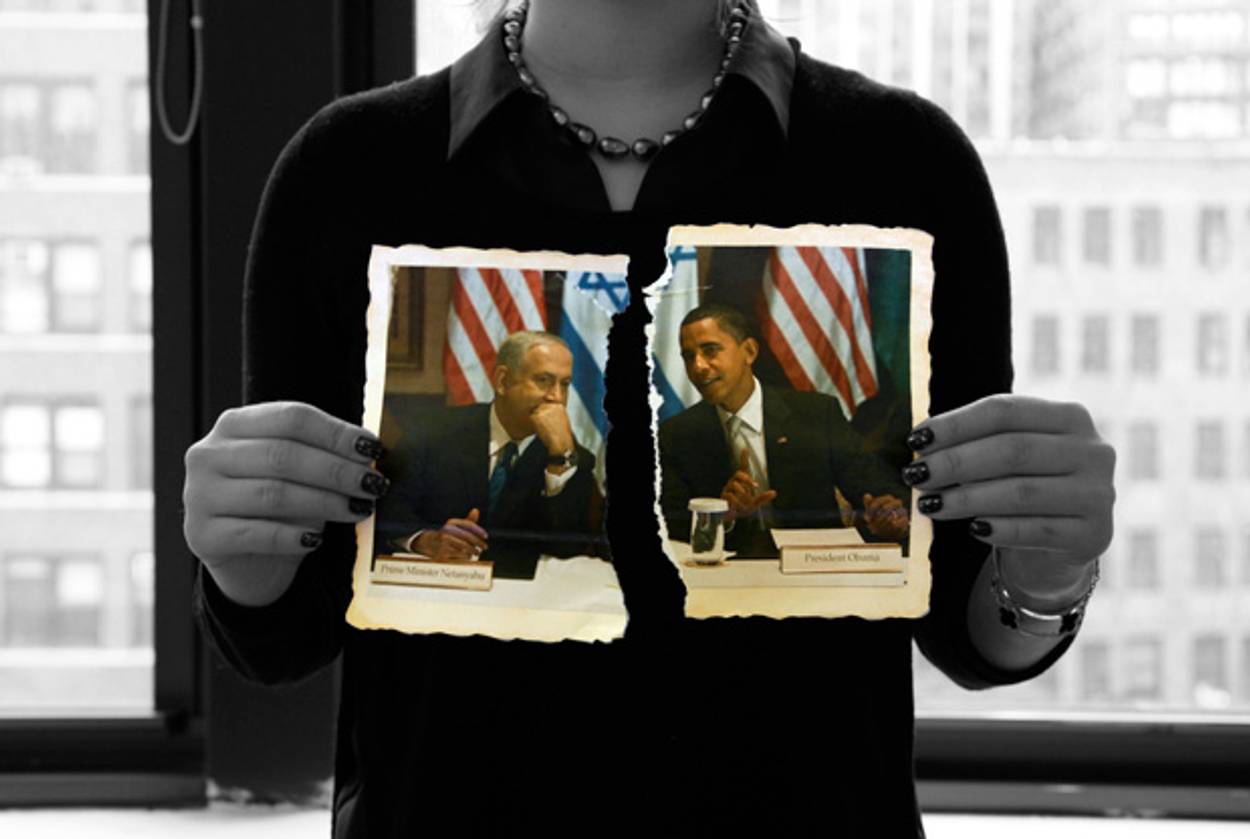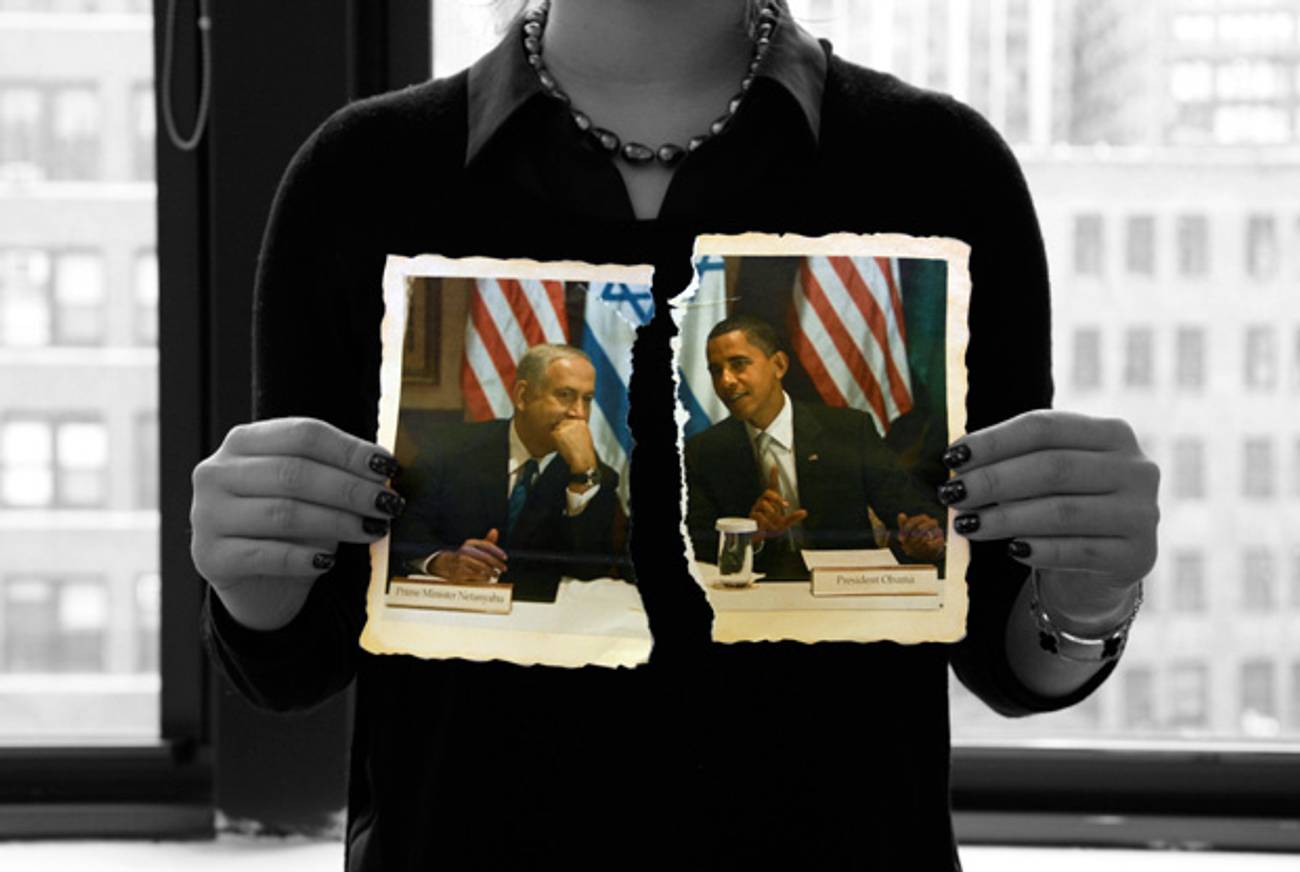Obama and Bibi Skip the Party
With the president and the prime minister otherwise occupied, will this year’s AIPAC confab bring any results?




More than 12,000 American pro-Israel advocates gathered this morning for the opening of the annual conference of the American Israel Public Affairs Committee, arrayed as they are every year in suits and khakis and yarmulkes decorated with both stars-and-stripes and Stars of David. But for the first time since 2010, neither the U.S. president nor the Israeli prime minister will be joining them at downtown Washington’s hulking white convention center.
In the wake of a presidential campaign in which Israel became the dominant hot-button foreign-policy issue, and that Barack Obama won decisively, AIPAC has attracted far fewer high-profile speakers than last year and the year before, when both Democrats and Republicans came to court the Jewish vote. President Obama, who is slated to visit Israel in March for the first time since becoming president, isn’t expected to address the gathering at all, and his most reliable stand-in on issues of foreign policy, former Secretary of State Hillary Clinton, is enjoying her retirement. Meanwhile, Israel’s Prime Minister Benjamin Netanyahu, is stuck in Jerusalem trying to cobble together a Knesset coalition. He is scheduled to speak Monday by satellite, but because of the seven-hour time difference it will be during a morning plenary session rather than at the prime-time gala dinner—a sharp contrast to his barnstorming visit two years ago, which included a rock-star welcome before the dinner crowd followed by a televised address before the entire U.S. Congress. As one AIPAC veteran put it, “He’s not even staying up until 3 a.m. in Israel to do the sat feed?”
Both Obama and Netanyahu came to office in 2009 eager to use their newly earned electoral mojo to effect their (very different) visions for the Middle East, but four years later, both men find themselves preoccupied with domestic affairs. The American Congress is paralyzed by stalled budget negotiations, and Israel remains in post-election limbo without a government at all. That leaves AIPAC’s activists gathered in the U.S. capital with little hope of seeing meaningful action.
AIPAC officials say their top legislative priority is a bipartisan Senate resolution affirming U.S. support for Israeli military action against Iran’s nuclear facilities. It’s in line with a cascade of AIPAC-supported bills passed by Congress over the past four years, none of which have dramatically changed the status quo on the key issues: Iran’s nuclear weapons program and the peace process. Iran continues to do whatever it is doing at Fordow and Natanz and who knows where else, the United States continues to search for a diplomatic solution, and the Israelis continue to fret about breakout capacity and red lines. A secondary push would exempt Israel from any cuts in foreign aid and grant the country special status as a strategic ally—allowing, among other benefits, increased intelligence-sharing.
Yet those goals feel incremental, or procedural, against the grander objective of reaching what Israeli Ambassador Michael Oren described Sunday morning as a “game-ender” in the standoff with Iran over its nuclear program. (Never mind settling the interminable question of ending the Israeli occupation in the West Bank.) Whatever promises—or demands—any of the speakers, from Vice President Joe Biden to Israeli Defense Minister Ehud Barak, issue from the massive stage in the grand convention hall, very little is likely to change on those key issues.
But short of a last-minute surprise appearance by the president, the conference will be relatively free of the Obama drama that has dominated the convention’s hallway chatter since 2008. The organization decided to sit out last month’s confirmation battle over former Sen. Chuck Hagel, Obama’s new secretary of Defense, and the issues that have historically provoked the greatest angst among delegates suspicious of Obama’s agenda—the settlement freeze and the use of 1967 borders as a basis for negotiating a two-state deal with the Palestinians—have faded into the background, thanks to the breakdown of the 20-year-old Oslo Accords.
That may account for the decision by organizers to leaven the opening plenary session Sunday morning—headlined by Israeli Ambassador Michael Oren, former White House Israel czar Dennis Ross, and former deputy National Security Adviser Elliot Abrams—with an appearance by Rep. Marcia Fudge, the new head of the Congressional Black Caucus, who was warmly welcomed by AIPAC’s president Michael Kassen as a former high-school classmate. “We have to focus on political changes taking place on our own shores,” Kassen, whose wife holds a local Democratic position in Connecticut, warned his delegation. He talked earnestly about increased congressional turnover, the rising costs of campaigning, and the shifting demographics of the American electorate—realities that elicited mostly silence, rather than bouncy cheers from the stands.
Which has some arguing that the best outcome of this year’s conference would be a certain degree of partisan healing, in the interest of preserving AIPAC’s longstanding claims on bipartisan, widespread appeal and support. “On this one issue, our love for Israel unites us, and there aren’t any other issues like that,” said Aaron Keyak, the interim director of the National Jewish Democratic Council. “I’m sure some people wanted to see a President Romney and a Vice President [Paul] Ryan, but even those people who campaigned for Romney-Ryan will be applauding for Biden.” But even that may be a far-off dream: Asked whether he’d be attending this year’s events, Keyak’s opposite number, Republican Jewish Coalition head Matt Brooks responded, “Not if I can help it.”
***
Follow all of our AIPAC coverage here.
Allison Hoffman is a senior editor at Tablet Magazine. Her Twitter feed is @allisont_dc.
Allison Hoffman is a senior editor at Tablet Magazine. Her Twitter feed is @allisont_dc.